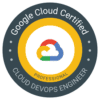Cloud DevOps Engineer

Possibility to buy vouchers to prepare for certification: Contact us
Course program
- Course
- Qwiklabs
- Course on demand
Developing a Google SRE Culture
Site Reliability Engineering (SRE) enables Google to bridge development and operations, while providing support for critical production elements. In this course, you will learn about SRE engineering best practices, the benefits of adopting an SRE culture, and how it can improve cross-functional collaboration.
This three-day instructor-led course teaches participants techniques for monitoring, troubleshooting, and improving infrastructure and application performance in Google Cloud. Guided by the principles of Site Reliability Engineering (SRE), and using a combination of presentations, demos, hands-on labs, and real-world case studies, attendees gain experience with full-stack monitoring, real-time log management and analysis, debugging code in production, tracing application performance bottlenecks, and profiling CPU and memory usage.
Cloud Operations and Service Mesh with Anthos
Explore adjusting existing clusters, setting up advanced traffic routing policies, securing communication across workloads, and observing clusters in Anthos.
Perform Foundational Infrastructure Tasks in Google Cloud
Explore Cloud Storage and other key application services, such as Stackdriver and Cloud Functions, and develop valuable skills you can use in all your Google Cloud projects. Upon completion of the quest, you will be able to earn a skill badge.
Implement DevOps in Google Cloud
Learn how to optimize the timeliness, stability, availability, and security of your software delivery capabilities using Google Cloud. Upon completion of the quest, you will be able to earn a skill badge.
Monitor and Log with Google Cloud Operations Suite
Learn the basics of the Google Cloud Operations Suite, an important service for generating insights into the health of your applications. This suite provides you with a wealth of information about monitoring, logging, and diagnostics of your applications.
Measure Site Reliability using Cloud Operations Suite
Learn how to set Service Level Indicators (SLIs), Service Level Objectives (SLOs), and Service Level Agreements (SLAs); create logs-based metrics, define alerts, and troubleshoot application issues with Cloud Trace, Debugger, Profiler, Monitoring and Logging.
Automating Infrastructure on Google Cloud with Terraform
Learn how to write infrastructure as code with Terraform. In this quest, you will get hands-on experience building, changing, and destroying infrastructure, managing local and remote state, importing infrastructure, and building your own modules.
Ce parcours vous intéresse ?
Create a training course that reflects your image
Contact us